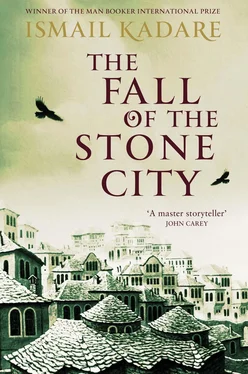During the course of the interrogation the investigators remembered that Little Dr Gurameto was also there. All this time he had been handcuffed by the left wrist to the other doctor’s right hand but he had not uttered a word for hours. Two or three times the investigators had been about to ask him something, but thinking that he had not been present at the events of that day, or perhaps simply because they were tired, they forgot about him.
Both sides were succumbing to exhaustion. They heard muffled sounds from the entrance to the cave. Then came footsteps and the tapping of a cane, like a blind man’s. The investigators were so tired that they entirely forgot Little Doctor Gurameto, who seemed to have evaporated like a ghost in front of their eyes. The two doctors had merged into one.
Big Dr Gurameto was experiencing something similar, except that the two investigators were not turning into one but had become three. “So there are three investigators,” he thought. “But thirteen won’t drag a word out of me.” The three figures hovered before him as if in a mist and one of them stammered some words in German.
Upon hearing a sudden noise the doctor opened his eyes for a moment, and he realised that this was not a dream. There really were three investigators in front of him, and one was speaking German. For the second time he was addressed with the words, “mein Herr”.
Gurameto shivered. An ashen light filtered through a crevice in the cave. Perhaps it was dawn. They were all fully awake now.
“Grosse Herr Gurameto,” said the newly-arrived investigator. “I am an officer of the Staatssicherheit, the security service of the East German Republic.”
The man’s German reached the doctor’s ears even more indistinctly than the investigators’ Albanian. The German said that he had flown from Berlin to interrogate him. He said that in the entire communist camp, there was no more important case than this. He invited the doctor to consider it seriously.
“I know of no other way,” Gurameto replied.
The German investigator had been briefed about the case and asked the doctor to tell him in a very few words what had happened on the day of 16 September 1943 and the following night.
Dr Gurameto nodded. He replied in German, the language of the question, and his account was as detailed as before.
When he had finished, the third investigator asked quietly, “Is that the truth?”
“Yes,” the prisoner replied.
The silence was insupportable. Then Gurameto noticed another figure, an interpreter whispering into the ears of the two Albanian investigators.
“What you have just said is not the truth,” said the German.
Dr Gurameto’s expression did not change.
“The German officer, Colonel Fritz von Schwabe, whom you insist that you met on 16 September 1943, was not in Albania at the time you claim.”
The German’s voice sank lower. Not taking his eyes off the handcuffed prisoner, he said that Fritz von Schwabe had not been present on Albanian soil or indeed any other kind, because he had been buried four months before.
Gurameto’s face turned wan.
The other man explained that Colonel Fritz von Schwabe had died of wounds in a field hospital in the Ukraine on 11 May 1943. The investigator had brought his death certificate and photographs that showed the colonel in the hospital, and his funeral.
“There’s no need to go on,” Gurameto interrupted in a broken voice. His head suddenly fell forward, as if struck by a blow at the back of the neck. “I need to sleep,” he added after a moment. “Please.”
The investigators exchanged glances.
The uproar caused by what was called the conspiracy of the century spread across the entire planet. The investigation was conducted by eleven communist states, in twenty-seven languages and thirty-nine dialects, not to mention sub-dialects. About four hundred doctors imprisoned in as many cells were subjected to continuous interrogation.
None of the inmates of these cells received any news from outside, and those outside were ignorant of the cells. The Cave of Sanisha was only one cell among many.
At noon the following day the three investigators, with the interpreter a shadowy presence behind them, paid another visit to the two handcuffed prisoners in the cave.
“The truth was. . the truth is that I suspected from the very start that it wasn’t him.”
Gurameto’s first words crept slowly out of his mouth and were swallowed up by the echoing vault. He squinted in an effort to recall the time more clearly, casting his mind back to the square of the city hall, the wet asphalt and the tank crew who went up to the window of the closed café and raised their hands to their brows like peaked caps as they tried to see inside.
An aide had nodded towards one of the armoured vehicles, where the officer was waiting. On the way to the square the aide had told Gurameto explicitly, “The regimental commander, your friend from university, is waiting for you by the city hall.”
The colonel stood leaning against the armoured vehicle, in dark glasses, with one leg crossed over the other. Gurameto, even before he was close to him, felt his chest tighten with a spasm of doubt. After his greeting, “Don’t you recognise me?” the same spasm came again. His voice had changed. The man smiled and pointed to his face; it did not need a surgeon to notice the scars.
“Four wounds,” said the colonel, as the two spread their arms to embrace one another.
Of course the scars made a difference, Gurameto thought. But there were other things too. The uniform, the passage of fifteen years, the war.
The doctor described their conversation to his interrogators almost exactly as before: the colonel’s disappointment at the treachery of the Albanians and their violation of the laws of hospitality enshrined in the Kanun of Lekë Dukagjini , the threat of taking hostages and finally his own invitation to dinner.
He described the dinner in the same way, now dwelling on certain details, like the donning of the masks. This had been a fashion of the time at student dinners when the men were at university, even if he could not remember Fritz von Schwabe following it. Nor could he understand why the other man put on a mask and then took it off. Of course, from time to time the doctor’s suspicions had been aroused, especially when he caught out his guest in some error of fact. But he had put these doubts out of his mind for the reasons he had explained: the passage of time, his career in the army, the war. The doctor also said more about the following morning. His daughter, seeing them all asleep where they had fallen, thought that her father had poisoned his guests alongside his own family. He himself suspected his daughter of the same thing.
But now for the first time he mentioned his later suspicions. He never saw the German again. He tried once to meet him but was told that he was busy. On another occasion when he enquired after him he was told that there was nobody by the name of Fritz von Schwabe. He discovered later and only by chance that von Schwabe had been transferred elsewhere on duty. After that he heard nothing more.
The prisoner hung his head as a sign that his story was over. But a moment later he added that the other side had probably also deplored the dinner.
“What?” said the investigators almost together.
“I said that the Germans too may have disapproved of the dinner.”
“Aha.”
The silence was so protracted that everybody was sure that there was no more to say. The investigators whispered for a while among themselves. Shaqo Mezini was the first to speak.
“My question is a simple one: Why? A man arrives from far away, commanding the first regiment to enter another country and suddenly takes it into his head to change his name and pretend to be someone else. What is he up to?”
Читать дальше












